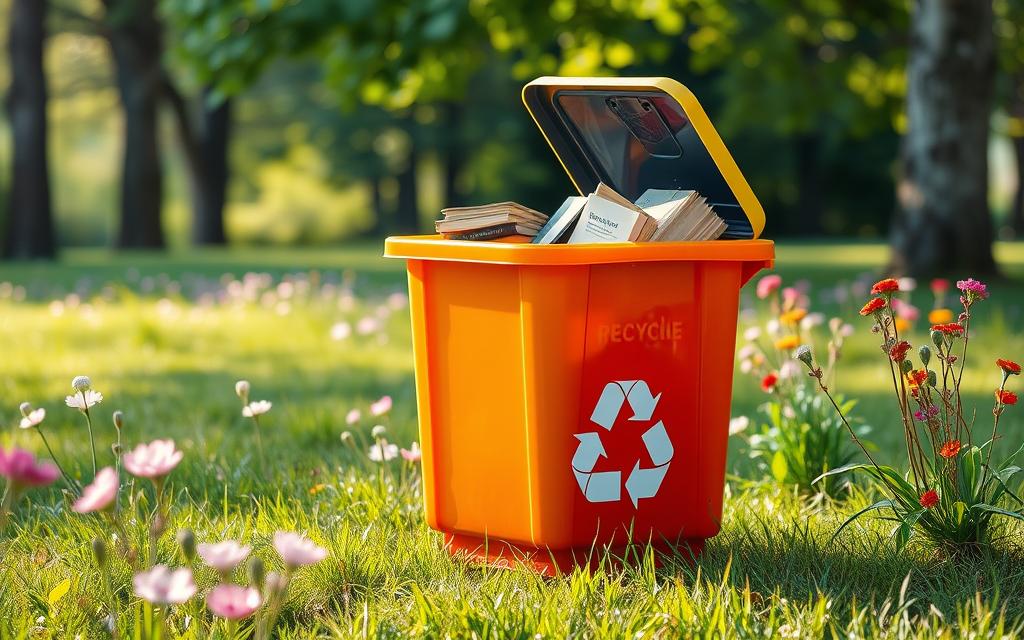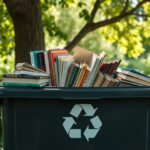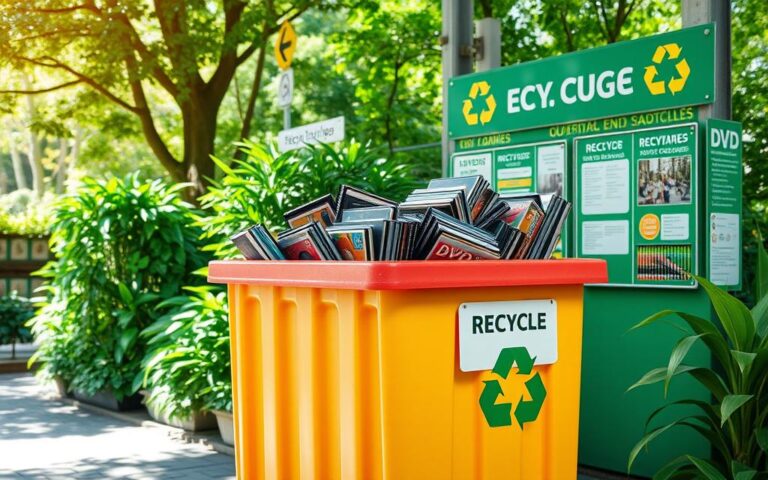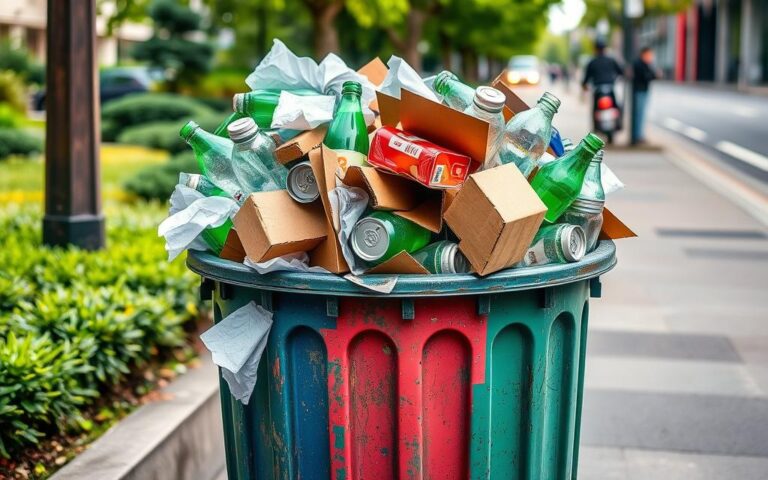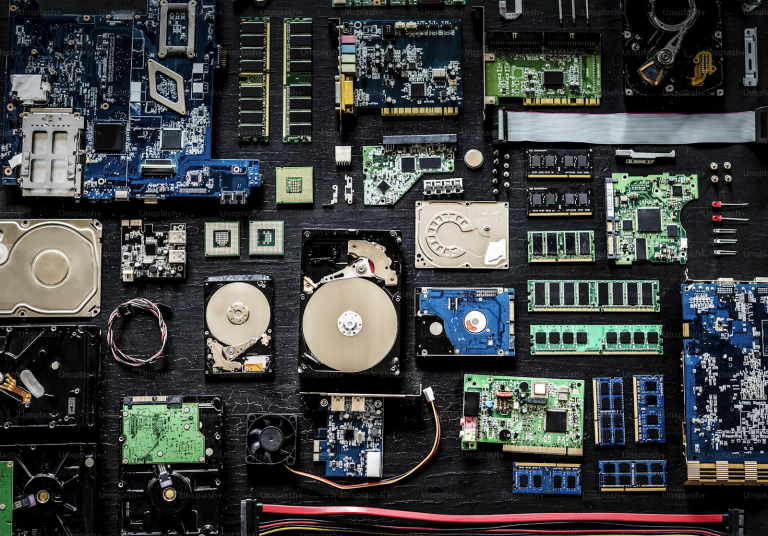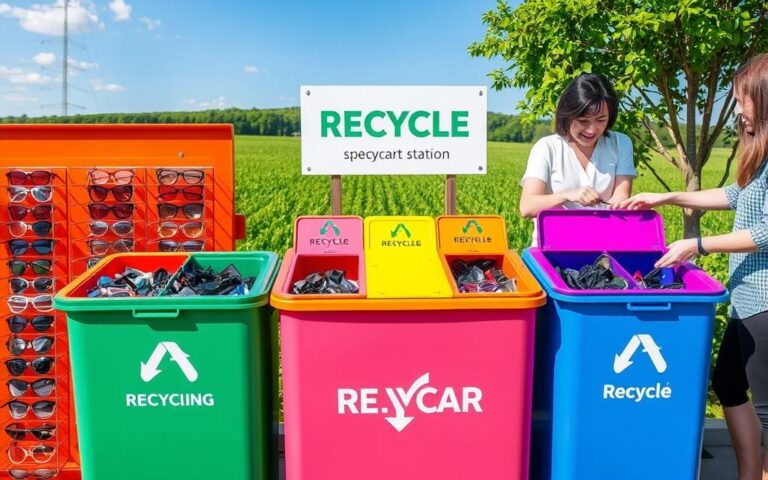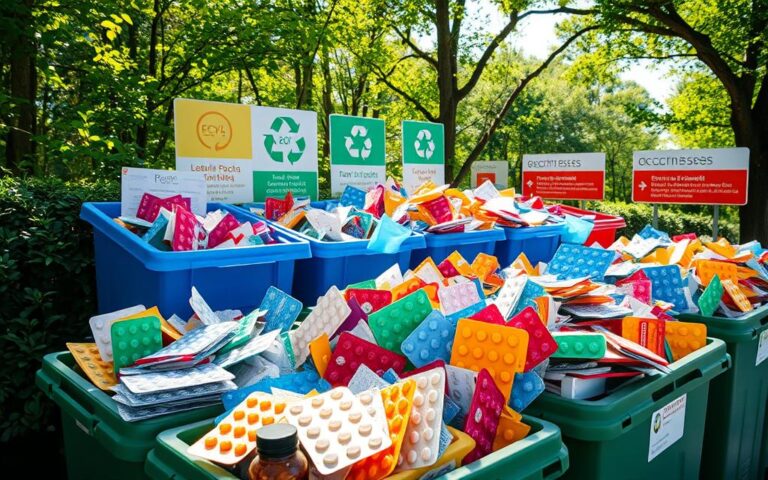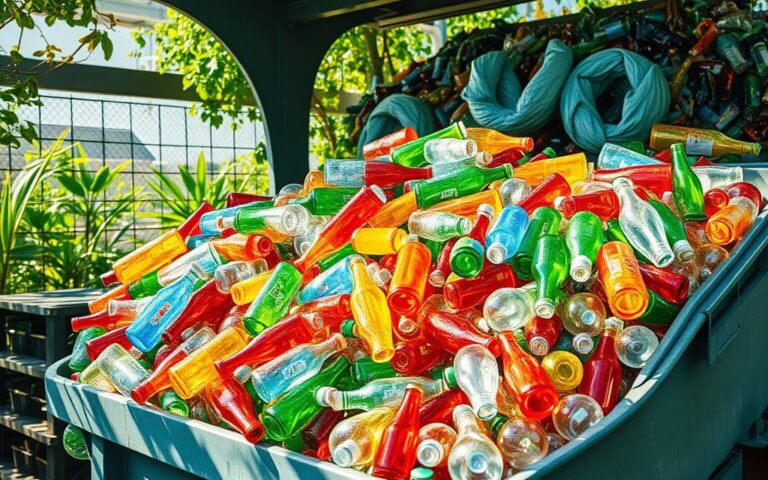Can You Put Books in the Recycle Bin? Responsible Disposal Tips
Today, everyone wants to know if they can recycle books. Only 33% of paper comes from recycling, showing a big chance to do more. Recycling books can save 17 trees per ton of paper. It also helps save water and electricity. If we choose to recycle books wisely, we can make a big difference for our planet. This article will tell you how to recycle books the right way. It will also suggest other ways to get rid of books responsibly. Let’s learn how we can help make recycled paper more available for new things.
Why It’s Important to Recycle Books
Recycling books is crucial not just for the environment but also for society. By recycling, we help preserve our natural resources and support our communities. This makes our world a better place.
Environmental Benefits of Recycling
Recycling books is great for the planet. For each ton of paper recycled, we save 17 trees, 380 gallons of oil, 4,000 kilowatts of energy, and 7,000 gallons of water. These savings show how we can make a big difference.
About 320 million books are thrown away each year. Recycling helps reduce this waste. Paper fibres can be reused 5 to 7 times, making book recycling a smart way to extend material life.
Social Impact of Donating Books
Donating books has a big impact on learning and literacy. It helps people, especially in less developed countries, to learn and enjoy reading. This can make a huge difference in their lives.
Through book donations, community swaps, and charity efforts, we keep books out of landfills. We also create a culture of sharing and learning. This shows how recycling and donating books help us all.
| Environmental Benefit | Resources Saved per Ton Recycled |
|---|---|
| Trees | 17 trees |
| Oil | 380 gallons |
| Energy | 4,000 kilowatts |
| Water | 7,000 gallons |
Can You Put Books in the Recycle Bin?
It’s vital to know how to recycle books to lessen your environmental impact. Many ask if recycling books is possible. Yes, it is, but you must follow certain guidelines to do it right and avoid harming the recycling process.
Recycling Guidelines for Different Types of Books
Books need different recycling methods. Here are the main rules:
- Paperback Books: These are simple to recycle. You can put them directly into the recycle bin without any prep.
- Hardcover Books: These need a bit more work. You should take off the cover and spine because they might be made of non-recyclable stuff. Only recycle the paper inside.
- Damaged Books: If books are wet, mouldy, or have yellowed pages, you can’t recycle them. They must be thrown away to avoid ruining the recycling process.
Knowing how to recycle books can make recycling work better and cut down on paper waste. In 2020, the U.S. sent about 640,000 tons of books to landfills each year. This is worrying, especially as we run out of landfill space. Recycling books right helps us reuse and recycle more paper.
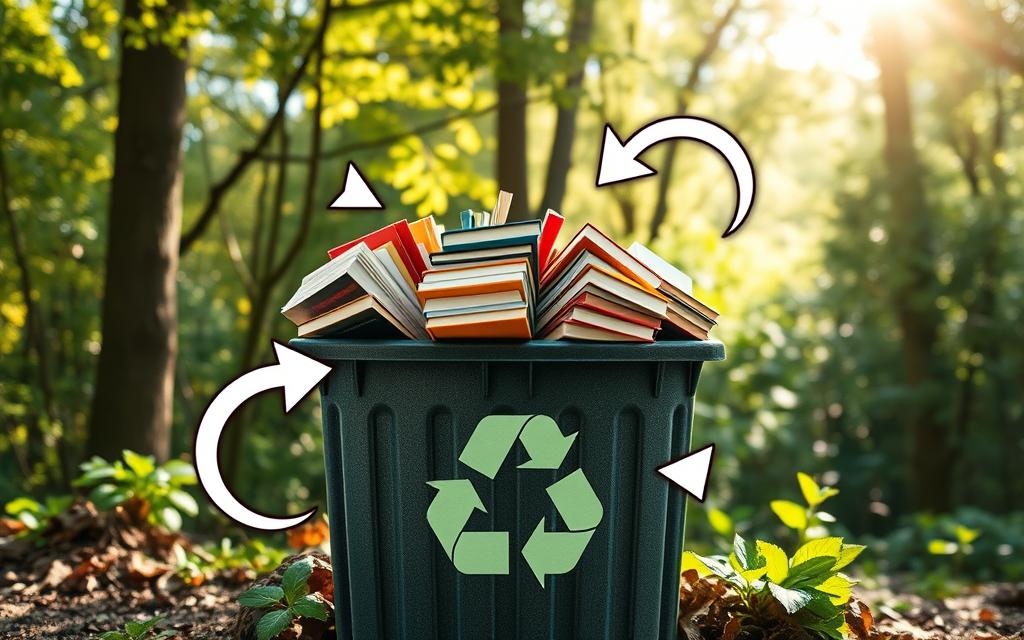
| Type of Book | Recyclable | Preparation Required |
|---|---|---|
| Paperback | Yes | No |
| Hardcover | Yes | Remove cover and spine |
| Wet/Mouldy | No | N/A |
Following these steps helps with better recycling and supports greener waste handling. In Massachusetts, the Talking Trash & Recycling programme teaches people about these important practices. This improves community recycling efforts.
Eco-Friendly Alternatives to Disposing of Books
Rather than throwing away unwanted books, look into eco-friendly ways to get rid of them. This approach helps make our communities more sustainable. Options like donating to local charities not only lessen waste in landfills. They also increase access to reading and learning.
Donating Books to Local Charities
Donating books can greatly help local charities like Goodwill or the Salvation Army. These places take gently used books to help those in need. This also keeps the books in use longer. Schools and libraries also accept book donations, if the books are still good to read.
By choosing sustainable reading habits, we avoid adding to the 640,000 tons of paper waste from books in the U.S. each year.
Community Book Swaps and Giveaways
Community book swaps are a fun way to share books with neighbours. You can give away books you’ve finished and find new ones for free. This can be arranged through neighbourhood groups or online. It’s a good way to reduce waste and connect with others.
Being part of book swaps supports sharing and community ties. It helps us all read more sustainably.
Choosing eco-friendly ways to handle old books helps our planet and our communities. We can inspire others by donating books or joining book swaps and giveaways. You can find out more on how to recycle books here.
How to Properly Recycle Your Books
Recycling books the right way starts with a careful method. This ensures old books are handled without harming the environment. Learning how to prepare for recycling makes a big difference in reducing waste. Doing a bit of work before recycling helps your local centres and supports green habits.
Steps to Prepare for Recycling
Start by sorting your books. You can recycle most paperbacks directly. But, you must remove the hardcovers’ non-paper parts first. These bits can cause problems in recycling facilities. Here are some steps to prepare:
- Remove any non-paper elements: Get rid of covers and any bits made of plastic or metal.
- Bundle your softcover books: This makes it easier for recycling centres to handle them.
- Assess the condition: If your books are still in good shape, think about donating them.
Finding Local Recycling Centres
Looking for local places to recycle books makes things simpler. A quick search can show you centres that have special setups for books and mixed items. Guides on recycling will tell you what’s okay to recycle where you live. Some good places to get rid of or donate books include:
- Local libraries
- Better World Books
- Goodwill and Salvation Army
- Trash to Treasure events
Use online tools like the Recycling Locator to find spots for your books. This helps keep them out of landfills. Following these steps shows your community you’re serious about recycling books.
Upcycling Ideas for Old Books
Upcycling books is a brilliant way to craft in an eco-friendly manner. It gives new life to beloved books. People can turn old books into unique art or useful items. This is a great way to be creative and mindful of reducing waste.
Creative Ways to Repurpose Books
There are lots of cool ideas to turn old books into something beautiful or useful. Let’s look at some projects you might like:
- Book Wreaths: Use pages to make seasonal decorations for your home.
- Bookmarks and Gift Tags: Create lovely bookmarks or tags from old pages.
- Personalised Journals: Old covers can be used to make unique journals.
- Wall Art: Arrange cut pages into wonderful wall decor for any space.
Pinterest is full of great ideas for changing old books into art or handy objects. Upcycling is fun because it lets you be creative. Plus, there are endless ways to give old books a new purpose.
Upcycling helps you express yourself, reduces paper waste, and keeps books out of landfills. It encourages us to be more eco-friendly. For DIY projects, check this link on making art from old books.
| Upcycling Project | Materials Needed | Benefits |
|---|---|---|
| Book Wreath | Book pages, glue, wire frame | Decorative, reusable |
| Bookmarks | Pages, scissors, ribbon | Customisable, practical |
| Wall Art | Book pages, canvas, mod podge | Aesthetic appeal, unique |
| Planters | Book covers, plastic liners, small plants | Eco-friendly, stylish decor |
Doing these projects shows off your artistic side and your commitment to the environment. This fun mix of creativity and eco-awareness reflects your care for nature and your imaginative flair.
Conclusion
Responsible book disposal means knowing how to recycle and donate. This way, we avoid adding to landfill waste. It’s key to understand recycling can be tricky because of certain materials like glossy pages.
Donating books is a great way to deal with extra books. Many charities, libraries, and schools love getting them. It helps spread the joy of reading to others and keeps books in use.
Being part of book swaps or using disposal services also supports communities. These actions help pass on knowledge and look after our planet for future generations.
By following these tips, everyone can help make sure books are valued, not thrown away. Sustainable book disposal is good for the earth and improves community life.
FAQ
Can I recycle all types of books?
Not every book can be recycled the same way. Paperback books can often be put straight into the recycling bin. However, hardcover books need the cover and spine taken off before recycling.
What happens to books that are not suitable for recycling?
Don’t recycle books that are wet, mouldy, or have yellow pages. They can mess up the recycling process. Instead, think about giving them to charities that take in damaged books or find new uses for them.
Where can I donate my unwanted books?
Places like Oxfam and the British Heart Foundation welcome book donations. Libraries, schools, and community book swaps are also great places to give books a new home.
How can I find local recycling centres for books?
Check local recycling rules and use tools like the Recycling Locator to find centres ready to take books. This helps you find the right place to recycle them.
What are some creative ways to upcycle old books?
Old books can be turned into wreaths, bookmarks, or journals. Look for craft ideas on sites like Pinterest to give old books new life in creative ways.
How does recycling books benefit the environment?
Recycling books saves trees, cuts down on waste, and needs fewer new materials. Every tonne of recycled paper can save about 17 trees. This helps protect forests and reduces pollution.
Are there any social benefits to donating books?
Giving books away can boost literacy and education worldwide. It spreads the joy of reading, supports learning, and narrows the literacy gap globally.

